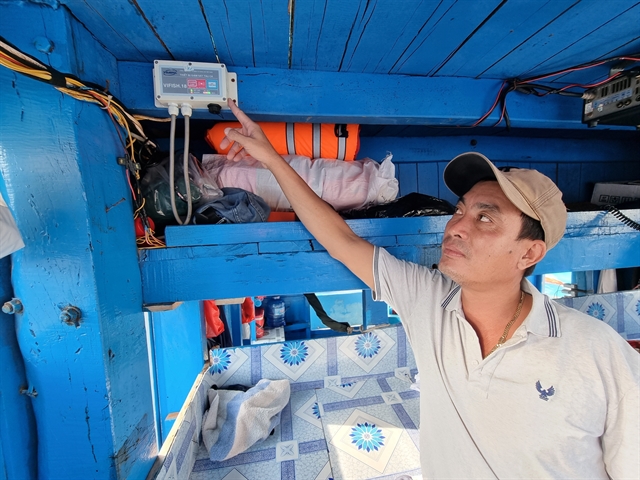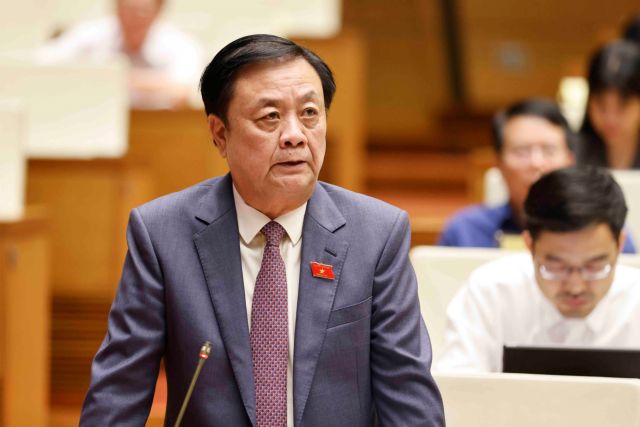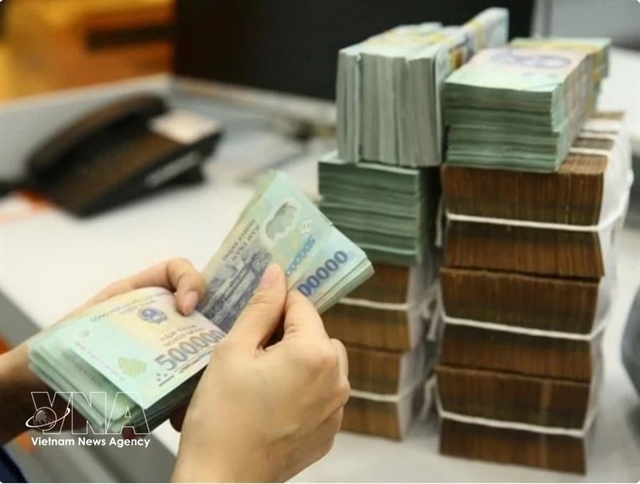 Society
Society

 |
| Minister of Agriculture and Rural Development Lê Minh Hoan at the question-and-answer session during the 36th session of the National Assembly Standing Committee on Wednesday in Hà Nội. — VNA/VNS Photo Doãn Tấn |
HÀ NỘI — Việt Nam's efforts to address the 'yellow card' warning from the European Commission (EC) for illegal, unreported, and unregulated (IUU) fishing over the past seven years had yielded some results.
The system for fisheries monitoring had been reorganised, with 28 coastal provinces now having fisheries control forces.
A Supreme People's Court resolution criminalising IUU-related offences had been established.
Minister of Agriculture and Rural Development Lê Minh Hoan answered the question by National Assembly deputy Trần Thị Nhị Hà of Hà Nội at the question-and-answer session during the 36th session of the National Assembly Standing Committee on Wednesday morning in Hà Nội.
Deputy Hà asked Minister Hoan about the current difficulties in persuading the EC to lift the yellow card for Việt Nam and whether the ministry had specific commitments to resolve the issue.
Minister Hoan said that the main strategy to resolve the issue involved effectively implementing the Việt Nam Fisheries Development Strategy to 2030, with a vision to 2045 and the Strategy for Sustainable Agricultural and Rural Development 2021-30, with a vision to 2050, approved by the Prime Minister.
Developing the fisheries sector would focus on three pillars of reducing fishing, increasing aquaculture and marine conservation to ensure fish stock for future generations.
He also added that despite a reduction in the number of fishing vessels from over 100,000 to 86,000, the fleet remained extensive compared to regional countries, affecting sustainable development.
In the future, the country needed to continue demonstrating its efforts to address the IUU yellow card, collaborate with the Ministry of Foreign Affairs, Ministry of Public Security and Ministry of Defence in implementing an action month.
Additionally, the limited expertise in fisheries necessitated collaboration with the Ministry of Education and Training to enhance awareness among fishermen to protect fishery resources.
Also at the question-and-answer session, National Assembly deputy Phạm Hùng Thắng of Hà Nam Province questioned minister Hoan about solutions for supporting the production and consumption of agricultural products, expanding new foreign markets for Vietnamese farm produce and completing legal policies on developing trademarks, brand ownership and key agricultural products in Việt Nam.
The Minister replied that the standardisation of all agricultural-product quality remained a significant challenge for the country’s agricultural sector.
“We cannot contemplate expanding into foreign markets if our products do not meet the market standards.”
Therefore, we must focus on issuing codes, specifying cultivation and breeding areas in the near future.
Minister Hoan emphasised that rebuilding centralized raw material areas and strengthening cooperatives were crucial to address the fragmented nature of the domestic agriculture sector.
Policies aimed at consolidating small agricultural fields into larger ones and transforming small forests into extensive areas required further attention from localities.
Moreover, developing regional specialty products was a channel for marketing processed goods and enhancing the value of local agricultural products at various levels.
Currently, we had over 13,000 OCOP (One Commune-One Product) items. Effective implementation of the initiative would relieve market pressure and create livelihoods and jobs for farmers.
Additionally, the policy of opening markets had been consistently applied to both domestic and international markets.
In highlighting measures to open up agricultural markets, he pointed out that the agricultural ministry and the Ministry of Industry and Trade had continuously negotiated protocols with various countries to facilitate agricultural exports.
Regarding trademarks and product branding, the agricultural ministry was conducting in-depth research, as having a strong brand could significantly increase value.
However, difficulties remained, he said.
Specifically, there was no National Assembly resolution mandating the Government to issue a resolution on branding.
“Besides, confusion persists between 'trademark' and 'brand',” he said.
While trademarks were easier to establish and protect, a brand reflected consumer trust in the quality, standards and consistency of a product.
Therefore, the agricultural ministry was collaborating with the Ministry of Industry and Trade to build agricultural product brands.
In his opening remarks at the beginning of the hearing session, Chairman Trần Thanh Mẫn said that the issues at the question-and-answer session were crucial matters of great concern to voters and the public.
So, he hoped the question-and-answer session would be lively, constructive and provide extensive reflections on the current situation, offering numerous proposals and recommendations to the Government and relevant ministers for better direction, resolution to address difficulties to meet the expectations of voters and the people nationwide. — VNS




